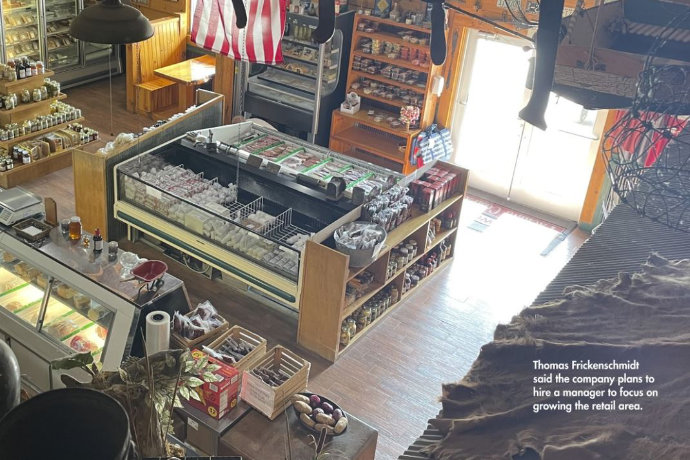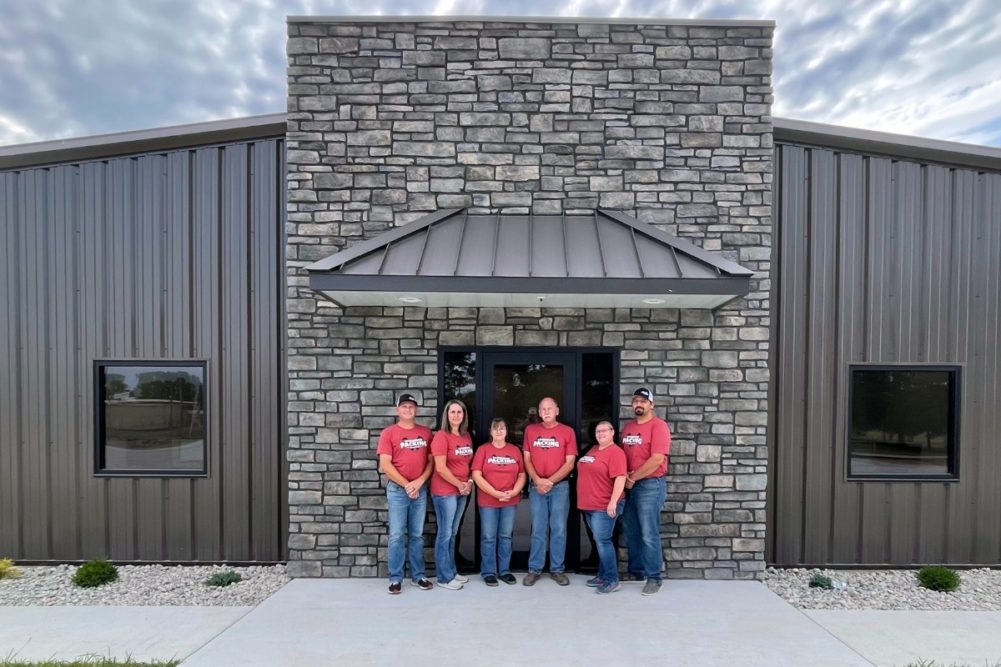In the heat of the COVID-19 pandemic, most Americans were scrambling to find stable food supplies like meats, and the focus turned to finding local sources. Finding enough employees became a difficult task for short-handed meat plants. It was certainly a booming time for small, family-operated plants, particularly those who found local livestock producers searching for a place to process their animals.
“We were so busy with custom slaughter and processing orders that we were booked almost two years ahead,” Thomas Frickenschmidt recalled. So why did the now 39-year-old, second-generation chief executive officer of Frickenschmidt Foods in Lockwood, Mo., put out the word early last year that they would be discontinuing custom slaughter and processing? When plied with this question, Thomas explained how he and the family came to make a very tough decision that would change the future direction of Frickenschmidt Foods and its family-owned Lockwood Packing Co.
“We made a very hard decision. “As we looked ahead, we knew we had difficulty finding employees who wanted to work in a slaughter facility but had less problems in locating those who were willing to work in further processing, whether cutting and grinding meat, running equipment or making value-added finished products.
“It was our plan to move into more finished processing with the hope that we could use local meats and commodity markets to supply us and count on faster production with increased volume of finished product.”
Thomas said this change in direction allowed the business to grow from four to 35 employees and with the expansion of a 6,500-square-foot structure into 35,000 square feet of production space which opened last month, he projects that the company will be adding another 30 employees within the year.
Private label pivot
A major change for this company was focusing more attention on private labeling. They attended food shows and sought out new accounts that might want Frickenschmidt Foods to produce for them under federal inspection. Today that number of private label accounts has swelled to 45 companies and the products are sold across the United States, Canada, Kuwait and the United Arab Emirates.
Located in the agricultural town of Lockwood (45 miles from Springfield, Mo.), with a population of 950, the firm produces multiple flavors of meat snacks, including snack sticks and jerky products for its private label accounts. They also make 20 different products ranging from sausages, bratwursts, bacons, not including each category having their own flavor varieties offered.
Thomas explained that many of the local livestock producers the business once served now come back for assistance in finding locations to have their animals slaughtered and his company offers further processing services, whether for private labeling or their own household use.
Going “big time” is one thing but retaining your hometown attitude and values is something special at that level. Even through the mission adjustment, Frickenschmidt Foods has retained trust from its former customer base. He and his brother-in-law Steven are members of the local volunteer fire company. The company offers a fundraising program for their jerky and snack sticks that assists baseball and softball teams, the local chamber of commerce, 4-H and FFA chapters. More about that aspect of their business can be found on their website frickenschmidtfoods.com.
 Source: Frickenschmidt Foods
Source: Frickenschmidt Foods
Hard decisions
Lockwood Packing Co. was started by Thomas’s father, Allen Frickenschmidt, and his wife, Koleen, in 1987. Allen had worked at a small meat plant in nearby Lamar, Mo., until it got struck by lightning and was forced to close. They found a small meat shop in Lockwood for sale and bought it, bringing Thomas into a front row seat for learning the meat trade.
“I remember being about nine years old and having a rubber knife that I would pretend to cut meat with,” he reflected. “Then a few years later the man who ran the kill floor made me a small version of a skinning knife. I still have it, and it is so special to me.”
That original shop had 2,300 square feet and four employees, including Allen and Koleen. It grew with expansions in 1991 and 200l.
Frickenschmidt Foods was established in 2005, with Thomas at the helm, his wife Carol as chief financial officer, brother-in-law Steven Ogden as chief operating officer, and sister Jennifer Ogden at the head table for account management and shipping. It started off with a 4,000-square-foot addition to focus on beef jerky production and included a cooler, freezer, processing room, packaging room and a smokehouse. It saw an 8,000-square-foot expansion in 2012 and an additional 6,000 square feet in 2018. Most recently was another expansion of 35,000 square feet of production space which opened last month.
If this deliberate and successful growth pattern sounds remarkable, just think how Thomas felt in 2014 when he earned the annual Accomplishment Award from the American Association of Meat Processors for successful advancement and growth of a business in a short time.
 Source: Frickenschmidt Foods
Source: Frickenschmidt Foods
Relationships matter
In 2018, Thomas was elected president of the Missouri Association of Meat Processors. He credits the relationships he developed through the associations for bringing new ideas to the table. He reminds himself of the advice and warning the company accountant offered him several years ago when the family contemplated the change in direction.
“He told me that when we had to make a hard decision about the future direction for our company that we had ‘to take the emotion out of it.’ It was a reach from my father’s earlier view that if you weren’t cutting a pork loin you weren’t doing anything.
“It was not a unanimous decision to go in this new direction, but all of us in the family realized that despite our titles, we were all employees and we had to look at it from that perspective. In the end, we all came together.
“Looking back at the challenge we faced we are grateful that we made this major change. Thanks to the dramatic increase in volume, we can now get and keep great employees with higher wages, good insurance, IRAs and other benefits. Our philosophy is that we want to always be a hometown company that cares about its products, its service and its employees.
“We plan on hiring a retail manager and putting a growth focus on that retail area for the next expansion of our mission,” Thomas said.


